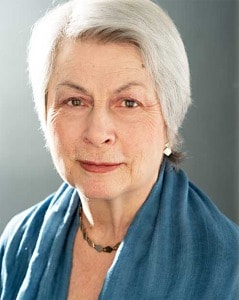
Revered voice and acting teacher Kristin Linklater has left her position as Head of Acting and Columbia University to return to her native Scotland. The author of Freeing the Natural Voice (1976) and Freeing Shakespeare’s Voice (1992), Linklater spoke with American Theatre in January prior to relocating permanently to Orkney, where she has established the Kristin Linklater Voice Centre. Workshops will be offered there starting in March.
Your career took off when you moved to the United States. Why are you leaving us for Scotland?
The last 12 years, I’ve had a small house in the Orkney Islands where I grew up, and where my family roots are. I started spending three to four months a year there, increasing the number of workshops I was teaching in Europe. Two years ago, I said, “That’s enough, I’ve done enough time in the air, and I’d like to see if I can bring my students to me rather than me going to them.”
I have built a beautiful studio with communal space on a bit of land up behind my house—it’s 99 square meters. Eventually there will be accommodations for 12, so there will be residential workshops.
Is the house on your family’s land?
I bought the house from a farmer who is also named Linklater—it’s an Orkney name, so there are a lot of Linklaters not related directly. It’s surrounded by farmland, and I look down on the house that I grew up in. There have been Linklaters in Orkney for 400 years, so I’m getting drawn back to my roots, unquestionably.
I have spent the whole of my professional life in the U.S., and I owe everything to the development of my voice work to this country. It could not have happened if I had stayed in the U.K.
Is the work in Scotland going to differ from the work you’ve done in the U.S.?
The big difference will be that I won’t be teaching in a program such as Columbia University’s, where I’ve been for 16 years. That I will miss, because that’s a 13-week program of voice and text, and voice and Shakespeare. What I will now be doing is mostly week-long or two-week workshops, in both introductory basic voice work and advance voice work. I have about five different kinds of workshops that explore the connection of voice and text—which may sound simple, but it’s not. There’s your voice, which is made by breath and vocal cords and resonators; and then there’s speech, which comes from a completely different part of the brain. The unifying of those two activities, those brain-body activities, is fraught with peril, so we explore them both in imaginative and storytelling ways.
How do you see actor training developing in the future?
Realism—psychological realism, emotional realism, the truthfulness of people acting out their internal life—is always going to be a necessary part of an actor’s training. At the same time, there is an inevitable counter-energy that says all of that’s old-fashioned stuff. We want to create spectacle, or performance that reflects the 21st century, showing where we think technology is going to take us. The ability to interact with various media will probably be part of what actors can expect in their training. But the human voice is necessary in any of these endeavors.
What’s been the most memorable teaching moment
for you?
They’re all apocalyptic! I’ve been teaching for 16 years on the 15th floor on the tower of Riverside Church, overlooking the Hudson, with windows all around. In the winter, they leak and there will be little piles of snow inside the studio. And every now and again there will be a hawk looking in through the window. The place has accumulated a kind of vibrant character to it.
Freeing your natural voice sounds like a simple idea, but it very often takes some discovery of why your voice is not free, and those discoveries tend to sit back in childhood. So every now and again, someone lets a deep breath into their bodies and the tears flow and memories come back, and it is psychologically liberating and sometimes extreme and dramatic. So we’ve had, I would say, as many dramatic emotional moments in that studio as you would find on any stage! And I wouldn’t trade that for anything.
What three things would you take with you to a
desert island?
Well, I’d obviously take The Complete Works of William Shakespeare. So long as I can make a fire, I’d have to have a kettle so I can make my tea in the morning, my own blend of English breakfast and Earl Grey loose tea, and a teapot.
What’s the secret to a long life in the theatre?
Passionate interests. Following your own creative instincts and energy. Making your own work, even when nobody else is asking you to make it. Keeping a sense of humor. Developing a thin skin and a tough soul. There’s theatre everywhere—you don’t have to be famous to have a life in the theatre. It’s a rich field to be in.

